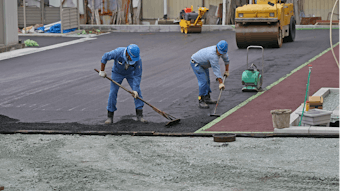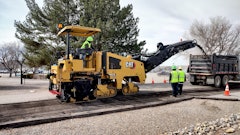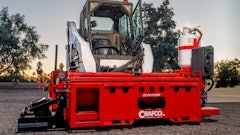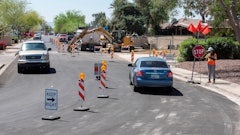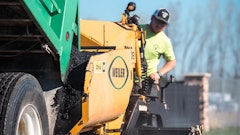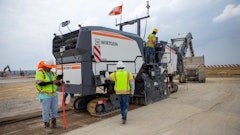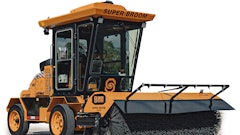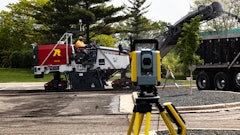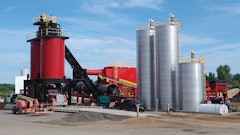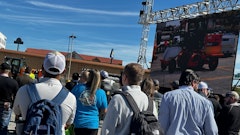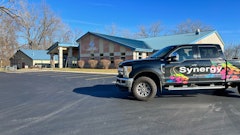
In 2010, Curran Contracting Company, a fifth generation full service hot mix paving company with facilities in northeastern Illinois, was awarded contracts with the Village of Cary and Dorr Township in McHenry County, IL to overlay and re-construct two roadways.
One of the largest paving contractors in the state of Illinois, Curran Contracting prides itself on its corporate philosophy of providing leadership and trustworthiness to its customers. And because the company truly aspires to be a premiere provider of infrastructure solutions, when its Crystal Lake Division was awarded the Village of Cary and Dorr Township projects, it wanted to find the best solutions for the problems at hand.
While these were two roadways with two similar problems, one method stood out as the best solution to the problems: full depth reclamation with Class C fly ash.
Full-depth reclamation (FDR) is a rehabilitation process in which the full flexible pavement section and a pre-determined portion of the underlying materials (base and/or subgrade) are uniformly pulverized and blended resulting in a homogeneous stabilized base course.
By addressing the entire pavement section, FDR is able to correct delinquent cross sections, increase the load-bearing strength of the base and use 100% of the existing materials. Substantial savings can be realized while meeting environmental goals.
There are many reasons to choose FDR:
- Completely eliminates an existing cracking pattern
- Allows for cross section corrections
- Cost effective when compared to total reconstruction
- Faster and easier than total reconstruction
- Facilitates road widening
- More uniform compaction of processed material
- Environmentally friendly
- Conserves natural resources
(subhead) The Village of Cary
The Village of Cary project, Bristol Way, involved the repaving of an existing residential street. The curb and gutter cross section had an average daily traffic (ADT) of less than 500, and by design, had four inches of existing asphalt removed by milling, which in turn was to be replaced with new binder and surface mix.
Upon removal of the existing asphalt, the underlying base course proved to be too unstable and needed to be replaced prior to the installation of the new four inches of hot mix.
American Road Reclaimers Inc., the stabilization sub-contractor on the project, used a fleet of three spreader trucks, all 6x6 Mack Chassis ready-mix style units to spread the fly ash to grade.
Each truck is capable of spreading up to 26 tons of fly ash (heaped capacity). The units are typically used in tandem, where one spreader is trans-loading and the other is actually spreading to grade.
Fly ash was processed 12 inches deep and compacted immediately behind the Wirtgen 2500 pulverizer.
Art Creaney, Curran’s area superintendent, consulted with the local engineer on the project, Kevin Betke with Christopher Burke Engineering. Together they did a feasibility study on the cost advantages of full depth reclamation versus undercutting.
The cost savings were rather dramatic:
- Fly Ash Processing: 4997 square yards @ $5.40/square yard = $26,983.80
- Undercut and replace with 12 inches of CA-6 (base rock) for 1670 cubic yards @ $55/cubic yard = $91,850
This method saved the Village of Cary over $60,000, which is a 71% cost savings.
(Subhead) The Dorr Township project
Davis Road, the Dorr Township project, is a typical rural cross section secondary roadway that exhibited many distresses. Block cracking, longitudinal cracking, high water table and subgrade issues were prevalent in the project assessment evaluation.
Troy Strange, assistant highway engineer for McHenry County consulted with Marc Frame, Curran vice president/project manager, to come up with a solution to fixing the road in the most cost efficient manor without disrupting the traveling public.
Davis Road is a main route for commuters, so the decision was made to keep the road open to commuters and do half the roadway at a time.
Davis Road was one of two roads the highway commissioner selected to correct obvious base deficiencies. The other road was bid to pulverize without stabilizing and deficient areas were addressed through undercutting, while Davis Road was stabilized with Class C fly ash.
"It's in our best interest to offer our customers the most cost effective solutions that help solve their infrastructure problems," says Frame. "By using a process like FDR, agencies can stretch their road budgets and complete more lane miles without the high cost of total reconstruction."
The existing base course was able to be widened which allowed for proper compaction of the new HMA lifts along the edge of pavement.
The stabilized base course was able to better withstand the heavy truck loads placed upon it during the paving process.
Again, the cost savings were rather dramatic:
- Fly ash processing: 14,623 square yards @ $5.30/square yard = $77,469
- Undercut and replace with 12 inches of CA-6 (base rock) for 4875 cubic yards @ $60/cubic yard = $292,500
This method saved over $200,000 at a 74% cost savings.
"For small agencies such as townships that cannot afford complete reconstruction, FDR can be a viable alternative that is still within their budget," says Strange.
